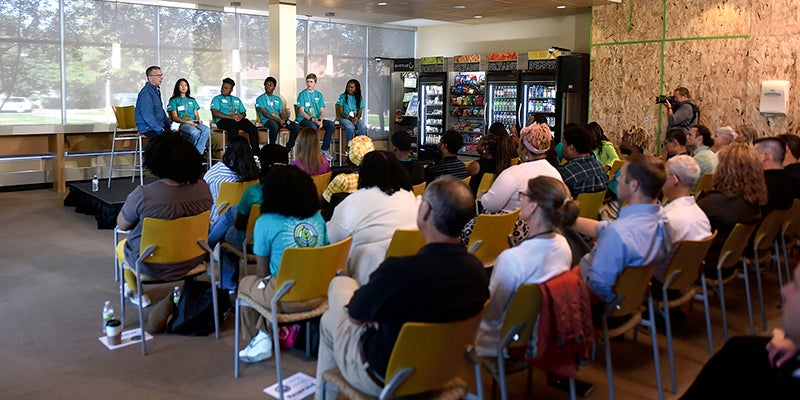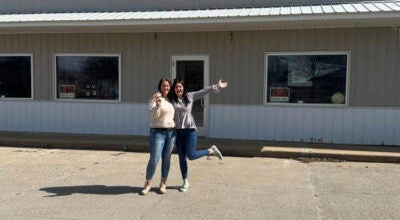A seed for the future; DCA, new worker looking to help Hormel Institute commercialize its findings
Published 10:53 am Tuesday, November 15, 2016

- Judy Lundy has been hired as commercialization/innovation doordinator to help The Hormel Institute. She’s been working with the Austin Community Growth Ventures, a new nonprofit funding by the Hormel Foundation. Eric Johnson/photodesk@austindailyherald.com
Austin leaders just planted a seed that could eventually reap a major bounty; however, it may take years, if not decades, to reach the harvest.
“We’re just turning over the sod here,” Judy K. Lundy said. “We’re not sure what we’re going to plant yet.”
Lundy has been hired as the commercialization/innovation (CI) coordinator of Austin Community Growth Ventures (ACGV), a 501c3 organization established by the Development Corporation of Austin and funded by The Hormel Foundation.
Lundy will be tasked with helping staff at The Hormel Institute begin seeking and developing ways to take their research, ideas and patents and convert them into commercialization and entrepreneurial opportunities.
She’ll be a resource to help scientists take on a different mindset from the publication-driven focus. She wants them to ask: How can their research translate into a commercial or business venture?
Lundy will work closely with Institute Executive Director Dr. Zigang Dong with leadership and researchers to understand their ideas and assist them in the invention disclosure process.
All inventions and discoveries that arise through research conducted at The Hormel Institute are owned by the University of Minnesota and subject to the Board of Regents Intellectual Property Policy.
The CI coordinator maintains close collaboration and regular communication with the University of Minnesota Office for Technology Commercialization (OTC).
“We are very thankful to The Hormel Foundation and DCA for their vision in helping translate our discoveries into new drugs and therapies,” Dong said in a press release. “We welcome the expertise provided by Judy and the ACGV board and know this support will be a key factor in making commercialization efforts successful.”
‘You gotta start’
Since the Hormel Institute is part of the University of Minnesota, many resources are already available. However, Institute staff face a hurdle in that relationship: distance.
Lundy noted it’s a more than three-hours round trip from Austin to the university and back.
Lundy has been learning about the University of Minnesota’s process for commercialization, going to the Twin Cities for classes to learn how its processes work. Then she’ll be taking those initial lessons to staff and researchers at The Institute.
“We’ve got to get them motivated to do this,” Lundy said. “We have to make sure they understand the opportunities there to do that.”
Here, they want to stir the scientists passions and make it easy for them to pursue such efforts, Lundy said.
Good medicine without being good business won’t succeed, Lundy said. It has to be economically sound and favorable.
“You can have a wonderful drug or something, but if it isn’t going to make money and there isn’t any market, nobody’s going to create a company out of it,” Lundy said.
So, she noted, her job is to help create a business plan, find a market and figure out how to make money and grow Austin with these ideas.
The process will not happen overnight.
DCA Executive Director John Garry admits incubating such a business could be looking at a five to 10 year process to see the fruits of this labor, if not longer.
“But you gotta start if you want to get there,” Garry said with a laugh. “For now, I think what we’re we’re trying to do is build kind of from the ground up an ecosystem that supports these types of companies.”
An Austin boon?
Austin Community Growth Ventures was established in 2015 to promote understanding of commercialization, assist with business development, provide space for companies and promote collaboration among area students and faculty with local research.
“Judy’s broad range of skills in business and product development, project management and systems analysis will be a tremendous asset to this first initiative launched by ACGV,” Hormel Foundation Chairman Gary Ray said in the release. “We anticipate increased employment opportunities surrounding the products and processes Judy helps evolve into patents.”
She also has more than 25 years working for Mayo Clinic in various leadership roles, as well as clinical and research experience. Lundy has a Master of Business Administration from Iowa State University and Bachelor of Science in Medical Technology from Mankato State University, with a year of professional study at the University of Iowa.
Lundy is chief operating officer and co-founder of K&L Bioscience. From 2008 to 2015 she was the chief executive officer, president, chief operating officer and co-founder of Mill Creek Life Sciences, which manufactures products used to grow stem cells for use in regenerative medicine.
Lundy hopes to take the lessons learned from Mill Creek and her experiences to help empower scientists at The Institute.
“We’re just going to start lots of Mill Creeks in Austin,” she said.





